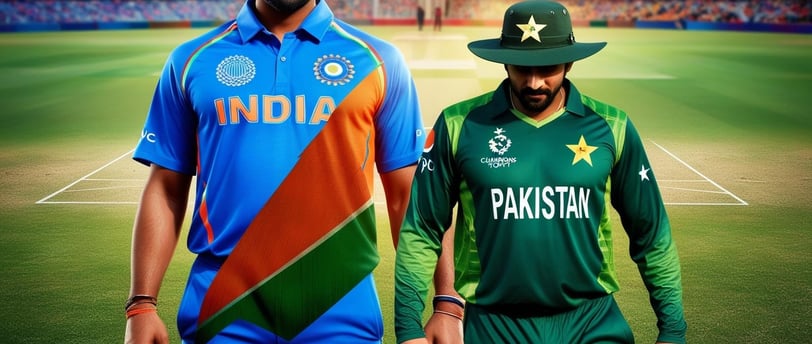India-Pakistan Cricket Rivalry: Champions Trophy 2023
Explore the controversy surrounding India's refusal to wear jerseys with Pakistan's name for the Champions Trophy 2023. This tension highlights the complex relationship between politics and sports, emphasizing national pride and political sensitivities in the India-Pakistan cricket rivalry.
INDIASPORTS


Champions Trophy Controversy: India Refuses to Display Pakistan’s Name on Jerseys
A fresh controversy has emerged surrounding the upcoming Champions Trophy scheduled for February-March 2025, which is set to be co-hosted by Pakistan and the United Arab Emirates (UAE). The Board of Control for Cricket in India (BCCI) has made it clear that it does not want its players to wear jerseys displaying Pakistan’s name during the tournament. This demand has led to rising tensions between India and Pakistan's cricket boards, as both parties continue to navigate the intricacies of hosting and participating in international cricket events amid political sensitivities.
BCCI’s Position: Reluctance to Display Pakistan's Name
According to sources close to the BCCI, the Indian cricket board has formally requested the International Cricket Council (ICC) to intervene and resolve a series of concerns related to the Champions Trophy. One of the primary issues is India's objection to wearing jerseys that feature the name of Pakistan, the host country. The BCCI, citing political tensions and the sensitive nature of India-Pakistan relations, does not want its players to be associated with Pakistan in such a visible and public manner.
Furthermore, Rohit Sharma, the captain of the Indian cricket team, has been instructed by the BCCI not to attend the captains' press conference and the photo shoot scheduled to take place in Pakistan before the tournament begins. The BCCI has also requested that the events, which typically precede the start of the tournament, be moved from Pakistan to Dubai, a neutral location that would avoid potential political friction.
An insider from the BCCI emphasized that the board’s position is clear, stating that “the ICC had already accommodated India’s request to not schedule its Champions Trophy matches in Pakistan, so these are minor issues." The BCCI’s stance highlights the ongoing diplomatic and security concerns that often influence India’s participation in events held in Pakistan.
PCB’s Response: Displeasure and Call for ICC Intervention
The Pakistan Cricket Board (PCB) has expressed its deep displeasure at BCCI’s demands, particularly its refusal to wear jerseys featuring Pakistan’s name. The PCB views this move as a breach of ICC’s official clothing code, which mandates that players representing their countries must wear the official gear, including the logos and names of the host country and sponsors. The board is hoping that the ICC will step in and mediate this issue, ensuring that the tournament proceeds smoothly and without unnecessary conflicts.
The PCB’s response highlights the challenges of organizing international events in politically sensitive regions, where cricket and national pride are often closely intertwined. As the tournament draws nearer, the PCB and the ICC will need to find a resolution that satisfies both parties, ensuring the success of the Champions Trophy without compromising the integrity of the competition or the political realities at play.
The Larger Context: India-Pakistan Tensions in Cricket
The India-Pakistan cricket rivalry is one of the most intense and emotionally charged rivalries in the history of the sport. Cricket matches between these two nations are not just sporting contests but carry deep political and nationalistic significance. The ongoing diplomatic tensions between India and Pakistan further complicate their interactions on the cricket field, leading to issues like this one, where even a seemingly routine matter—such as the official jerseys—becomes a flashpoint for disagreement.
Historically, India has been cautious about engaging with Pakistan in international sporting events, particularly cricket. In the past, India has skipped bilateral series or insisted on neutral venues when forced to play Pakistan. The complex relationship between the two countries, marked by disputes over Kashmir, border issues, and security concerns, often spills over into sports, making every India-Pakistan encounter a highly charged event.
Impact on the ICC and Future Relations
This latest controversy has the potential to test the ICC’s role in managing the delicate balance between sports and politics. The governing body of international cricket has long maintained a policy of neutrality in political matters, but with India and Pakistan, the lines often blur. The ICC’s ability to mediate between the two countries will be crucial in ensuring that the Champions Trophy remains a successful and fair tournament for all participants.
The situation also raises broader questions about the growing influence of political dynamics on international cricket. As global tensions evolve, especially in regions like South Asia, the role of cricket boards and international bodies like the ICC will be increasingly scrutinized. The challenge of maintaining the integrity of international sports while respecting the complex political realities of participating countries is something the ICC will need to navigate carefully in the coming years.
What’s Next for India and Pakistan in the Champions Trophy?
As the controversy continues, all eyes will be on how the ICC handles these concerns raised by the BCCI. The Champions Trophy is one of the premier cricket tournaments, and the participation of both India and Pakistan is crucial for its success. However, as tensions over issues like jersey branding and official representations show, the challenges of organizing global events in politically sensitive regions are very real.
Both the BCCI and PCB will need to find a way to ensure the tournament proceeds without further disruption. Whether through diplomatic channels or further negotiations, resolving the issue of jersey branding and the captain’s press conference will be vital to maintaining the Champions Trophy’s credibility as an international cricket event.
